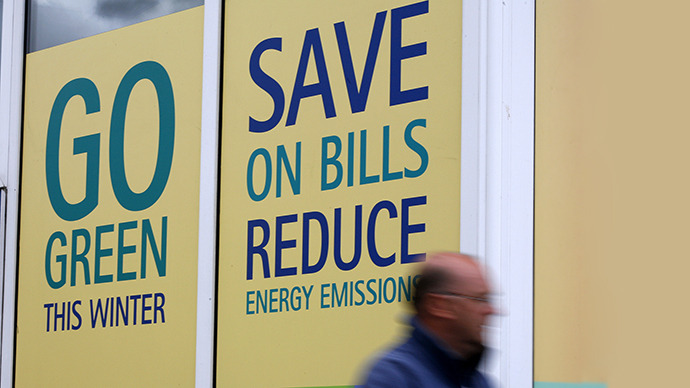‘Green policies the last thing UK economy needs’

As ‘new green regulations’ come into force in the UK and power plants close, the country has no option than to rely on imported energy sources. With its troubled economy, a green policy is the last thing Britain needs, Richard Wellings told RT.
The country’s energy regulator Ofgem warned that new green
regulations and policies could send fuel bills soaring as early as next
month.
“The European commission is overregulating for no good
purpose,” Richard Wellings, deputy editorial director at the
Institute of Economic Affairs, said.
RT:Not great news for consumers. We’ve heard that we
are going to be relying more on imports, but at the same time we
are trying to meet our climate change target, we need to get all
polluting power plants off the UK system. So is this
unavoidable?
Richard Wellings: I don’t think so. This is really
terrible news for consumers. So energy prices have gone up by
a 160 per cent since 2004. We’ve got 6 million households in fuel
poverty, expected to rise to 9 million within just three years. And
the problem is, of course, by having a high energy price in this
country it tends to export economic activities from countries such
as China or India. So with an overall effect of climate change
being very small, it actually could end being
counterproductive.
RT:You mentioned China and India. The government has
said “Don’t panic, consumers. We’re going to keep Britain’s lights
switched on” and actually as countries like China are demanding
more imports that’s pushing the global process higher. So we are
actually removing ourselves from the risk, aren’t we? We are
looking towards renewable energy, non-fossil fuel types of
energy?
RW: No, it means really exposing the UK more to external
risk. For example, importing gas is a lot more vulnerable to
security risks than importing coal. It comes from potential
flashpoints, such as the Persian Gulf. And of course some US states
now enjoy electricity prices around a third the price of in the UK,
gas prices – around the fifth the price. This is putting British
businesses at a major competitive disadvantage.
RT:Why is the government in the UK doing that? You
are saying one thing, you are saying a different thing. What is
going on?
RW: Part of that is going from the European commission. So
the reason why these power stations are closing is because of the
European pollution controls. There is more to do with acid rain and
climate change – there is a very small environmental problem, but
the cost of it is going to be absolutely massive. So we are talking
about tens if not hundreds of billions of euros across the whole of
the EU. Once again, the European commission is overregulating for
no good purpose.
RT:Why is the UK following these plans if you are
saying there is evidence to the country this isn’t going to be good
for energy consumers; not going to be good for Britain as a
whole?
RW: Well, it has probably to do with the rebranding of
the Conservative party, so that they are trying to claim to be the
greenest government ever. There is obviously strong support for
environmentalism within a certain faction of the Conservative Party
and David Cameron. So, it is mostly ideological, but the problem is
given the economy’s hardly growing this is really the last thing
Britain needs.
RT:How concerned should energy consumers be right
now? What does this mean for the British energy
consumer?
RW: They should be very worried about rising prices.
According to some estimates bills could double again over the next
decade. Business users should be very concerned. Rather than power
cuts you’ll expect to have business users on special contracts
where the power could be cut off for them before households
actually get their power cut off. If we get a very cold winter this
is to be extremely worrying.
The statements, views and opinions expressed in this column are solely those of the author and do not necessarily represent those of RT.












